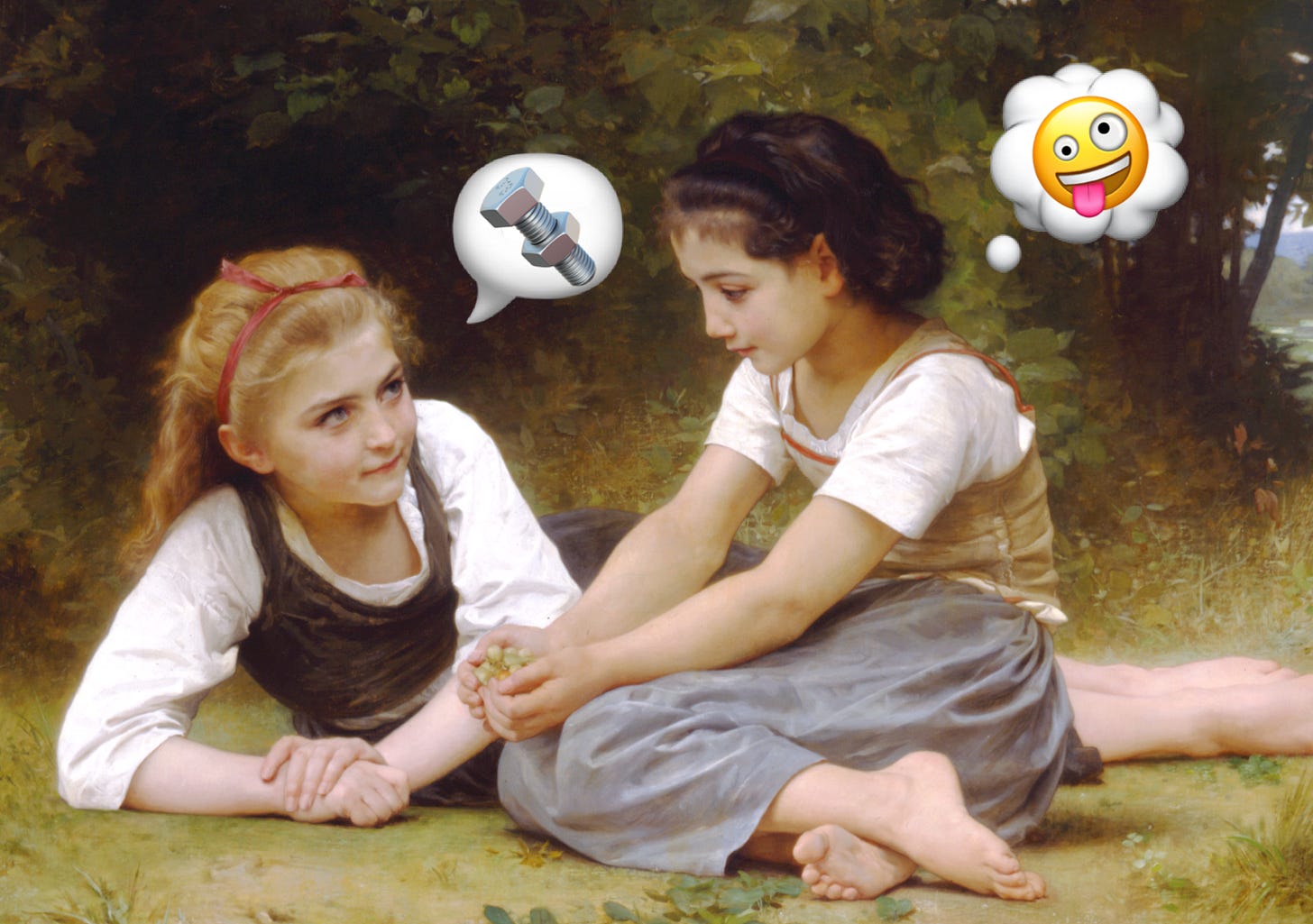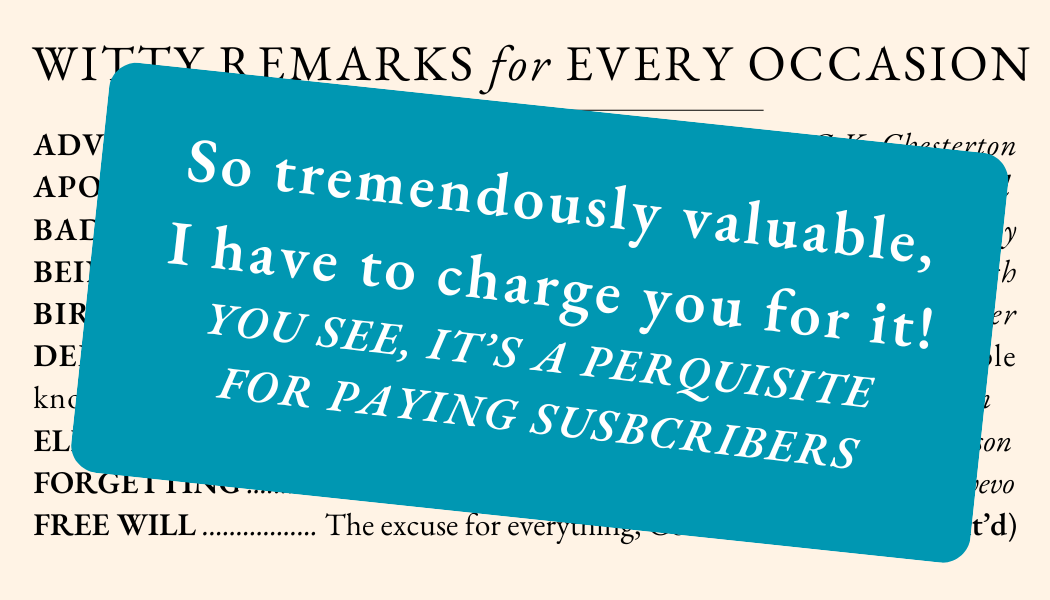The Wit’s Guide to Nuts
Or, to shell with it
Nuts to you! But which nuts, precisely?
For the definitive list, we turn to Harlan Pepper, the character played by Christopher Guest in Best in Show. Before the whole world became a mockumentary, Guest was the master and commander of the genre. And beyond being breeder of bloodhounds, his character in the 2000 film had a special talent:
I used to be able to name every nut that there was. And it used to drive my mother crazy, because she used to say, ‘Harlan Pepper, if you don’t stop naming nuts,’ and the joke was that we lived in Pine Nut, and I think that’s what put it in my mind at that point. So she would hear me in the other room, and she’d just start yelling. I’d say, ‘Peanut. Hazelnut. Cashew nut. Macadamia nut.’ That was the one that would send her into going crazy. She’d say, “Would you stop naming nuts!”
Nuts, like soup, are funny. Hence soup to nuts, a spectrum that ostensibly describes the alpha and omega courses of a meal but is really just an excuse to use two funny words in one idiom.
But still: Which nuts, precisely? It’s a polysemous word, meaning it has many definitions. (Advisory: The word polysemous is not polysemous.)
“I’m Charley’s aunt from Brazil — where the nuts come from.”
— Babbs Babberly in the Brandon Thomas play Charley’s Aunt
Maybe we mean just plain nuts? As a psychiatric designation, these three words were immortalized in a Far Side cartoon that remains my mother’s favourite. Legend has it that JPN is used as secret medical slang to diagnose a general nuisance.
“There are a lot of different kinds of nuts in the Lord’s fruitcake.”
— Walter Hearn
Is it offensive? Certainly you can find plenty of mental health advocates who discourage its use, but their opprobrium is nothing compared to the Motion Picture Association of America’s campaign against the word in the 1930s and ’40s:
“Even innocent words are forbidden because they may have a double meaning or because they are distasteful to the paranoid nice-nellyism of the American. ‘You are nuts’ is a forbidden phrase. Nuts might mean testicles to some sensitive masturbator.”
— Ben Hecht
For a time, you could only use the word nut to describe a crazy person, but eventually the ban extended to all uses of the word. On television, NBC advised writers to substitute the word screwball for nut when describing a wacky character. And so you had a situation where W.C. Fields was unable to say “nuts to you!” in a 1940 movie called The Bank Dick.
“Bed before 11, nuts before seven.”
— Dorothy Parker
Perhaps the highest purpose of the word nuts is a general expression of defiance, most defiantly expressed by a general. And that’s how the ban on nuts was cracked. Anthony McAuliffe was leading the U.S. 101st Airborne during the Siege of Bastogne in 1944 when he received a flowery four-paragraph ultimatum from his Nazi counterpart. “The fortune of war is changing,” it began, before demanding a surrender because “All the serious civilian losses caused by this artillery fire would not correspond with the well-known American humanity.”
McAuliffe responded to this Clausewitz copycat with one of the great American retorts:
To the German Commander.
NUTS!
The American Commander.
Which was further improved when the German had to ask the colonel who delivered the message what it meant. “In plain English?” Joseph Harper replied, “Go to hell.” Eventually, he did.
“It is splendid to be a great writer, to put men into the frying pan of your words and make them pop like chestnuts.”
— Gustave Flaubert
Because it’s fun to say the word nuts, we say it in as many contexts as we can. Hence the three separate uses in the mid-century story of the motorist who blows out a tire while driving by an insane asylum. As he’s putting on the spare, he drops all four lugnuts into an open drain. “Nuts!” he exclaims.
Across the fence, an observant mental patient makes a suggestion.
“Why don’t you take one nut off each of the other wheels and that way you can make it into town in the car with three nuts on that wheel?”
The motorist first looked surprised, then relieved, then a little chagrined.
“Don’t feel bad about it,” says the patient. “I may be nuts, but I’m not stupid.”
“Nuts to the educational value of suffering.”
— Robert Christgau
Letters from a nut
All my Erudite Paid Subscribers ought to have received the July and August Riposte Cards in the mail this week, or at least the EPSes who live within four mailing days of Toronto, Canada. Australians, sit tight! Emiratis, stay cool! This beautiful postcard is steaming your way:
I’ll reveal the August card design next week, but let me tell you now that it’s a riff on one of the great lines:
“Misery is almost always the result of thinking.”
— Joseph Joubert
Become a card-carrying subscriber!
Did you know that perk is short for perquisite? Did that perquisite up your ears? Then consider throwing me a few spondoolies for postage and I’ll mail you one of the above cards for your immediate edification and perpetual enjoyment.
Quote Vote
“Health nuts are going to feel stupid someday, lying in hospital dying of nothing.”
— Redd Foxx
The most damning story ever told about Barack Obama was that his evening treat, when he really let loose and indulged, was to savour exactly seven almonds. Apparently this wasn’t true, though his denial wasn’t rich with detail — maybe it was eight? Anyway, next week!
Was there a kernel of truth in the 265th issue of Get Wit Quick, your weekly seeding of clever quips? Or can we only truly use the term nut for indehiscent fruits? The oak tree that generates these weekly eggcorns (a mondegreen!) was my book Elements of Wit: Mastering The Art of Being Interesting. Also interesting: The Singapore acronym for No U-Turn Syndrome. Tap the ❤️ below to ensure you’ll never encounter another unshellable pistachio.





dear benjamin,
a great batch of quotes as always! some of my faves today:
“Misery is almost always the result of thinking.”
— Joseph Joubert
“There are a lot of different kinds of nuts in the Lord’s fruitcake.”
— Walter Hearn
“Health nuts are going to feel stupid someday, lying in hospital dying of nothing.”
— Redd Foxx
thanks for sharing!
much love,
myq
Great piece. So glad you included the Bouguereau. I bought a print many years ago since it represented my two young daughters, one dark and one fair. Now I just have to remember where it is...